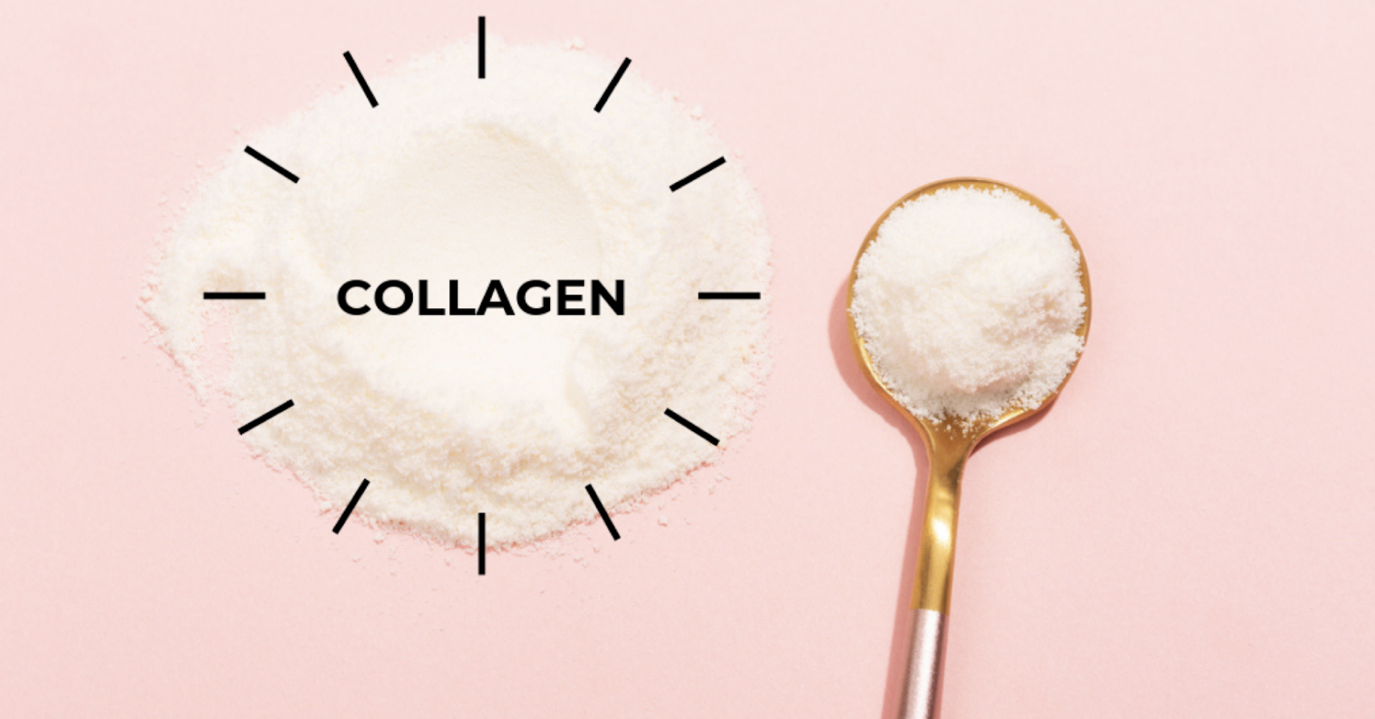Written and researched by: Sian Howard (beauty therapist, makeup artist; & soon-to-be-qualified, university-trained nutritionist)
Reviewed, edited and supervised by: Tara Leong (qualified nutritionist)
Do collagen supplements do anything for the skin? The rise of “nutri-cosmetics” has made sprinkling a daily dose of collagen in your smoothies so hot right now, with bold claims that it can reduce wrinkles and promote that youthful glow.
But are collagen supplements really worth all the fuss, or are they just another beauty hoax?
- What does the research say about collagen?
- Does it do anything for our skin?
- What types of collagen supplements are best (if any)?
What is it?
Collagen has fast become a buzzword ingredient in many industries. You can buy collagen to slather on your face, as a powder for your smoothies, and packets of bliss balls with added collagen for ‘glowing’ skin. It’s big business too, the estimated global market for collagen products is tipped to reach nearly AUD$10 billion by 2025.
Collagen is the most abundant protein found in the human body. It’s the scaffolding that gives our skin strength and elasticity, keeping our skin plump and youthful-looking while helping to repair skin damage. It’s a framework for our bones, gives structure to tendons and ligaments, and is even found in our organs, muscle, blood vessels, hair, and nails. You will find it referred to as the “glue” that holds us together.
In terms of beauty products, collagen and vitamin C (which is necessary for the body to make collagen fibres) have long been considered excellent products that go on top of your skin (topical ingredients) by the cosmetics industry.
Skin Care
From around 25 years old, many of our normal skin functions begin to slow down and our collagen levels decline, causing wrinkles, sagging, and dryness. Skin aging is a natural process sped up by lifestyle factors such as nutrition and smoking; and external factors like photo-aging from sun exposure, which causes the most damage to collagen.
This is where ingesting collagen has recently begun to slide into the picture of skin health, being marketed as internal skincare or “nutri-cosmetics”.
There are claims that drinking or eating collagen will rebuild the collagen fibres in our skin from the inside – ironing out wrinkles, firming droopiness and increasing hydration.
Bombarded with Choice
Google “collagen supplement” and you’ll certainly be bombarded with choice – Hydrolysed or peptides? Marine or Bovine? Type I or Type III?
The popular supplements are labeled as hydrolysed collagen or collagen peptides. You’ll likely read online that one is better than the other, but this is not correct. They are the same thing.
To explain, proteins (such as collagen) are large chains of small amino acids joined together. Our body must break the large proteins down to smaller molecules – amino acids and peptides. It does this through a process called hydrolysis – to make the proteins more easily absorbed by the body.
There are also several sources of collagen. Collagen is a big, complex protein but structurally, it’s the SAME whether it’s coming from a fish (marine), cow (bovine), pig (porcine), chicken (avian) or a vegetarian (from egg-shells) source. Although marine and bovine sources seem to perform well in studies, just consider any food allergies or dietary preferences when making your choice, as they are much the same in terms of function and effect.
There are at least 28 different types of collagen in our bodies but you’ll mainly hear about procollagen, and Types I, II and III. Essentially, they’re all the SAME protein. So regardless of what type, it’s still collagen and doesn’t really matter which one you choose.
Does it Work?
Is there evidence and research to support the claims that collagen makes our skin look better?
In reviewing all the studies that have been done on collagen, there is still limited quality research available, and the definitive effects of collagen supplements on skin are yet to be fully understood. Many of the studies have been done on animals such as mice and rats, so these same results can’t be assumed in humans (because, you know…we aren’t rats).
There is also no strong evidence that collagen is absorbed more by the skin than other parts of the body. Unfortunately, we can’t just tell the collagen to go to our wrinkles! There are other parts of the body that may uptake the collagen just as readily as the skin.
Even when looking at the few human studies that have been done, it’s impossible to make a general statement about how effective collagen supplementation really is. This is because the studies have been conducted on different skin types, of different ages, with different dosages, of different supplements, and different methods of assessing the results. That’s a lot of differences!
For example, some studies suggested benefits to the skin from taking collagen supplements. However, the supplements trialed didn’t just contain collagen but other proven skin-boosting ingredients, like antioxidants and polyphenols.
Plus, results of some human trials were based on participant questionnaires (simply asking the people in the study whether the collagen had improved the skin) rather than blinded clinical assessments with dermatological measuring devices. This makes the results pretty unreliable, as participants could just think and report that the product improved their skin (placebo effect). One UK study even allowed its participants to have botox and filler during the trial! So even if it did find that wrinkles were reduced, how do we know if it was the collagen or the botox?
Doses of collagen in human studies ranged from 1-10 grams of collagen per day. This is on par with supplements you can buy – the five most popular commercial collagen supplements recommended a dose from 5-20 grams of collagen/day. Plus, they all contained vitamin C, and antioxidants like CoQ10, which are also known to improve skin health.
Food vs Supplements
Do we need collagen supplements? In a nutshell, we can get the amino acids required to build collagen (collagen synthesis) from a normal healthful diet. To make collagen, our body uses the amino acids from the food we eat, and links them up to make proteins (such as collagen),- which is then taken to different parts of the body. One of those parts, might be the skin. Really, this marvellous and unique ability of our body to do this, defeats the need for additional collagen supplementation.
Interestingly, consumption of phyto-estrogens found in soybeans and lentils may also prevent the loss of collagen, while a recent Dutch study found a fruit-dominant diet was associated with less facial wrinkling in women.
So what other foods improve the skin? Well, that’s an article for another day (and another gabillion hours of researching).
The Verdict
Will it help with wrinkles? Maybe, the jury is still out.
- There are simply not enough quality trials in this area to draw firm conclusions about the benefit of collagen supplements on skin appearance. To determine if collagen supplements do anything for the skin, more rigorous studies are required by scientists.
- Early research is showing promise in the potential benefits of collagen on other parts of the body including improved joint and heart health, increased muscle mass and prevention of bone loss, healthy hair and nail growth.
- Taking a collagen supplement is not going to harm you (well, except for that kidney you had to sell to afford it). If you like it and can afford it, go for it. If you can’t, then don’t stress that you’re missing out.
- A healthy balanced diet is considered the best way to boost your skin’s supply of ALL the nutrients it needs to naturally boost collagen production and other functions such as cell turnover.
- Aim to eat the recommended servings of protein, fruit, veggies and healthy fats (such as avocado, olive oil, nuts and seeds), and drink plenty of water.
- Invest in good quality skincare with active ingredients
- And always, always wear sunscreen
A sustained approach from the inside AND the outside can give you the best skin of your life!
ABOUT THE AUTHOR
Sian Howard
Almost-Qualified-Nutritionist
As a professional makeup artist for over a decade, Sian was used to giving her clients the illusion of beautiful skin. This led her to completing a Diploma of Beauty Therapy so she could help them achieve the reality of beautiful skin. Realising the skin-deep approach to beautiful skin had limitations, Sian enrolled in a Bachelor of Nutrition. Soon to graduate, her interest lies in a threefold approach to beauty – combining makeup, therapeutic and nutrition knowledge to help her clients look and feel their most beautiful every day.


